Do you feel sad and upset on your birthday? Do you ask yourself “Why do I feel depressed on my birthday?” Birthdays are often considered to be joyous occasions, a day filled with excitement, celebration, and anticipation of the year ahead.
However, for some people, birthdays can be a source of sadness and depression. In fact, there is a term for this condition: birthday depression.
A lot of people tend to experience birthday depression on the days prior to their special day, on their birthday and even after the day has passed. Let’s find out why this happens and how to cope with it.
What is birthday depression?
Birthday depression meaning: Also known as birthday blues, it refers to feelings of disappointment, apathy, sadness and a lack of interest in one’s birthday. While it is normal to experience a range of emotions on one’s birthday, birthday depression is a more persistent and intense form of sadness that can be difficult to shake off.
Birthday depression is a condition that is characterized by feelings of sadness, anxiety, and loneliness that occur specifically on a person’s birthday. Such feelings can be triggered even when someone is simply thinking about their birthday and not specifically celebrating it. It can affect individuals of all ages and backgrounds.
Depression around birthday is a type of depression that occurs specifically on a person’s birthday. It can be caused by a variety of factors, including aging, expectations, and social pressure.
However, the condition typically occurs as the individual may struggle with their past issues and feel like they have not achieved what they could have achieved by their current age. This can lead to negative self-talk like “I always feel depressed on my birthday. So I will not celebrate it.”
- Depression during birthday can manifest as –
- Feelings of sadness or anxiety leading up to the birthday
- Social isolation
- Disinterested in attending social activities or events
- Apathy in celebrating their birthday
- Mood swings
- Anger
- Alcohol or drug misuse
- Suicidal thoughts or self-harm
Studies have found that birthday blues is closely associated with suicidal ideation as “socioculturally meaningful events have been shown to influence the timing of suicide.”
Hence, it is important to recognize the signs of birthday depression in order to help individuals who are experiencing this condition.
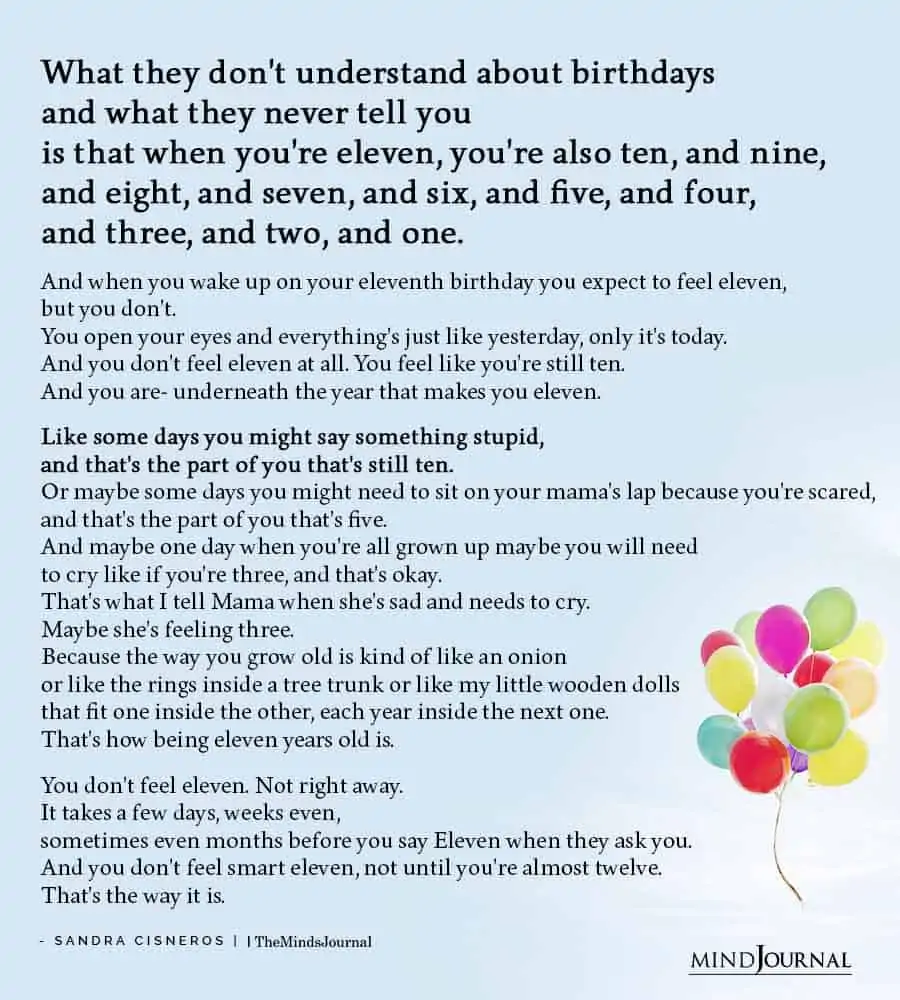
Related: 27 Things I Know To Be True On My 27th Birthday: A Letter To My Younger Self.
Signs of birthday depression
It is important to recognize the signs of birthday depression in order to help individuals who are experiencing this condition. Some common birthday depression symptoms include:
1. Sadness & anxiety leading up to the birthday
Individuals who experience this depression may feel a sense of sadness or anxiety in the weeks or days leading up to their birthday. They may feel like they are getting older or that they have not accomplished enough in their lives.
They may also feel a sense of loss or grief for their youth and the opportunities that they missed.
2. Lack of interest in celebrating the birthday
Individuals feeling depressed on birthday may have a lack of interest in celebrating their birthday. They may not want to have a party or receive gifts, and they may not feel like doing anything special on their birthday.
This lack of interest can be a result of feeling like their birthday is not important or feeling like they do not deserve to celebrate.
3. Withdrawal from social activities or events
People with birthday depression may withdraw from social activities or events that they would normally enjoy. They may decline invitations to parties or dinners, or they may cancel plans at the last minute.
This withdrawal can be a result of feeling overwhelmed by social pressure or feeling like they do not want to be a burden to others.
4. Irritability or mood swings
Individuals feeling depressed on birthday may experience mood swings or irritability. They may feel more easily annoyed or frustrated than usual, or they may snap at others for no apparent reason.
These mood swings can be a result of feeling overwhelmed by emotions or feeling like they are not in control of their own lives.
5. Substance abuse of misuse
Individuals with birthday depression may turn to alcohol or drugs as a way to cope with their emotions. They may drink more than usual or use drugs as a way to numb their feelings.
This increased use can be a result of feeling like they cannot cope with their emotions or feeling like they need to escape their problems.
6. Thoughts of self-harm or suicide
In severe cases, individuals with this type of depression may experience thoughts of self-harm or suicide. They may feel like their life is not worth living or that they are a burden to others. It is important to seek help from a mental health professional if you or someone you know is experiencing thoughts of self-harm or suicide.
Related: “I Wish I Didn’t Wake Up Tomorrow” – What Is Passive Suicidal Ideation And How To Cope
Researchers believe that suicide risk increases notably during and around birthdays as birthdays can be a source of stress, anxiety and depression in some vulnerable individuals, especially when celebrating milestone ages 20, 30 and 40.
Studies have also found that for men, “the 5 days before the birthday and the week after the birthday were associated with significantly higher odds for suicide”, and for women, remarkably “higher odds for completed suicide were observed 7-11 days before the birthday.”
This condition can cause significant distress for individuals who experience it. This is why it is important to recognize the signs of birthday depression in order to help individuals who are experiencing this condition.
Remember, it is okay to feel sad or anxious on your birthday, and you are not alone.
Is birthday depression a recognized mental health condition?
Have you ever asked yourself “I always get depressed on my birthday. Is this a sign of a mental illness?”
Birthday depression is not currently recognized as an official mental health condition in the Diagnostic and Statistical Manual of Mental Disorders (DSM-5), which is the primary diagnostic tool used by mental health professionals.
However, the symptoms of birthday depression overlap with those of other mental health conditions, such as major depressive disorder, anxiety disorders, and adjustment disorders.
While birthday depression is not specifically mentioned in the DSM-5, it can be considered a type of adjustment disorder, which is defined as a group of symptoms that occur as a result of a stressful life event, such as a birthday.
The DSM-5 lists adjustment disorders in the trauma- and stress-related disorders section of the manual. It is also important to note that the symptoms of birthday depression can be a sign of an underlying mental health condition, such as depression or anxiety.
Regardless of whether or not birthday depression is considered a mental health condition, it is important to take the symptoms seriously and seek help from a mental health professional, if needed.

Causes of birthday depression
Depression on birthdays can be caused by a variety of factors. It is important to identify the underlying causes in order to effectively address and manage the symptoms.
Here are some common causes of birthday depression:
1. Aging
As people get older, they may feel a sense of loss or grief for their youth and the opportunities that they missed. They may also feel anxious about their future, and worry about their health, the possibility of developing age-related illnesses and what lies ahead.
Aging can also bring physical changes that can be difficult to accept, such as wrinkles, weight gain, and a decline in physical abilities. For some individuals, their birthday can serve as a reminder of their own mortality, leading to feelings of anxiety and depression.
2. Unmet expectations
Another factor that can contribute to depression on birthdays is unmet expectations. Individuals may have certain expectations for their birthday, such as receiving gifts or spending time with loved ones, and when those expectations are not met, they may feel disappointed or let down.
A person may also feel pressure to achieve certain goals or milestones by a certain age, such as getting married, having children, or achieving career success. When these expectations are not met, they may feel like they have failed and experience feelings of sadness and depression.
This can be especially true for milestone birthdays, such as 20, 30, 40, or 50, where people may have high expectations for the celebration.
3. Social pressure
Society places a lot of emphasis on celebrating birthdays. There is often pressure to have a grand birthday party or to celebrate in a certain way. The person may feel pressure to have a perfect birthday, complete with parties, gifts, and celebrations.
This pressure can be especially strong on social media, where people may feel like they need to present a perfect image of their lives. This can lead to feelings of inadequacy or failure if a person’s birthday does not live up to these expectations.
The person may feel like they are not loved or valued by their friends and family, leading to feelings of loneliness and isolation.
4. Loneliness or isolation
For individuals who do not have a strong support network or who are isolated from friends and family, birthdays can be especially difficult. They may feel alone or that they have no one to celebrate with. This can lead to feelings of sadness, anxiety or depression.
5. Traumatic past experiences
Past traumatic experiences can also contribute to birthday depression. If a person has experienced a traumatic event on or around their birthday, such as the loss of a loved one, they may experience feelings of grief or sadness on subsequent birthdays.
Similarly, if a person has a history of abuse or neglect, their birthday may trigger traumatic memories or feelings of sadness and isolation.
Related: Why Do Narcissists Love To Ruin Birthdays and Holidays: 5 Reasons
6. Seasonal Affective Disorder (SAD)
Some individuals may experience birthday depression as a result of Seasonal Affective Disorder (SAD). SAD is a type of depression that occurs during the winter (or summer) months, when there is less (or more) sunlight and shorter (or longer) days.
This can lead to feelings of sadness or depression that can be triggered by a person’s birthday, which falls during this time of year.
Birthday depression can be caused by a variety of factors and identifying the underlying causes is important in order to effectively address and manage the symptoms.

How to cope with birthday depression
“What can I do if I feel depressed on my birthday?”
Well, coping with birthday depression can be challenging, but there are steps that you can take to help manage your symptoms. Here are some tips for coping with birthday depression:
1. Practice self-care
One of the most important things that you can do to cope with birthday depression is to practice self-care. This can include engaging in activities that promote relaxation and well-being, such as exercise, meditation, or spending time in nature.
It can also involve practicing healthy habits, such as eating a balanced diet, getting enough sleep, and avoiding drugs and alcohol.
2. Reach out to loved ones
While birthday depression can make you feel isolated or alone, it is important to remember that you are not alone. Reaching out to loved ones, whether in person or virtually, can help you feel connected and supported.
This can involve sharing how you are feeling, expressing your needs, or simply spending time with others.
3. Set realistic expectations
Setting realistic expectations for birthdays can help you manage your symptoms of depression. This can involve recognizing that birthdays do not have to be perfect, and that it is okay to feel a range of emotions on this day.
It can also involve focusing on small, achievable goals, such as spending time with one or two close friends or family members, rather than trying to plan a big party or celebration.
Related: Feeling Depressed After the Holidays? 5 Reasons Why and How to Fix It
4. Practice gratitude
Practicing gratitude can help you shift your focus from negative thoughts to positive ones. This can involve making a list of things you are thankful for or taking time to reflect on positive experiences. Focusing on gratitude can help you feel more optimistic and reduce symptoms of depression.
5. Celebrate in a different way
It may be helpful to celebrate your birthday in a different way than you have in the past. This can involve trying something new, such as a new activity or hobby, or celebrating in a different location.
It can also involve volunteering or doing something meaningful for others, like volunteering, which can help you feel a sense of purpose and connection.
6. Seek professional help
If the symptoms of birthday depression persist or interfere with daily life, it may be helpful to seek professional help from a mental health professional. This can involve working with a therapist or counselor to develop coping strategies or medication, if necessary.
Birthdays are a not a time to be sad
For some people depression and birthdays go hand in hand. The truth is, it doesn’t matter if you celebrate your birthday or not, it doesn’t matter if you are lonely or not, the only thing that matters is that you are grateful for this life and all the blessings the universe has given you.
Granted, our life can be extremely stressful and challenging at times, but it is also filled with unexpected joys, blessings, love, happiness and inner peace.
Celebrating or at least acknowledging our birthday is a way for us to appreciate ourselves and all that we have right now.
Related: 7 Ways To Feel Better When You’re Feeling Blue
Frequently Asked Questions (FAQs):
What is birthday anxiety?
Birthday anxiety is the feeling of stress, worry, or unease that can occur in anticipation of one’s birthday. This may be triggered by various factors such as aging, expectations, social pressures, or past negative experiences.
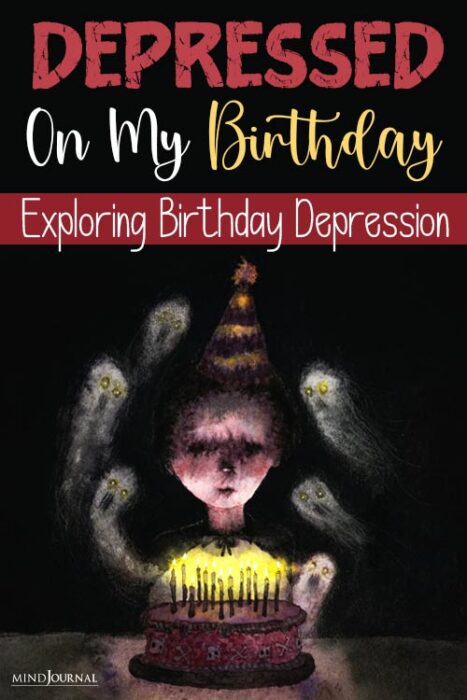
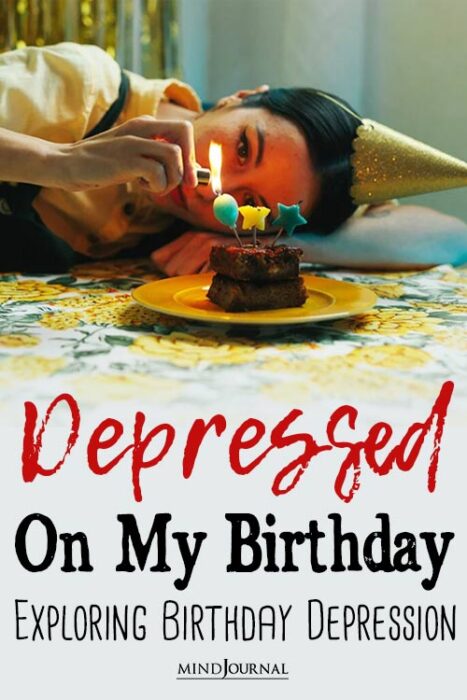
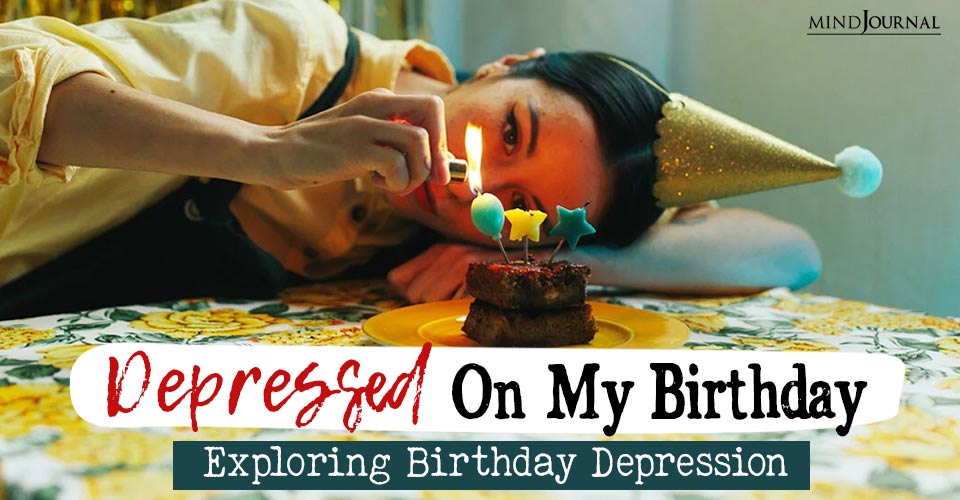
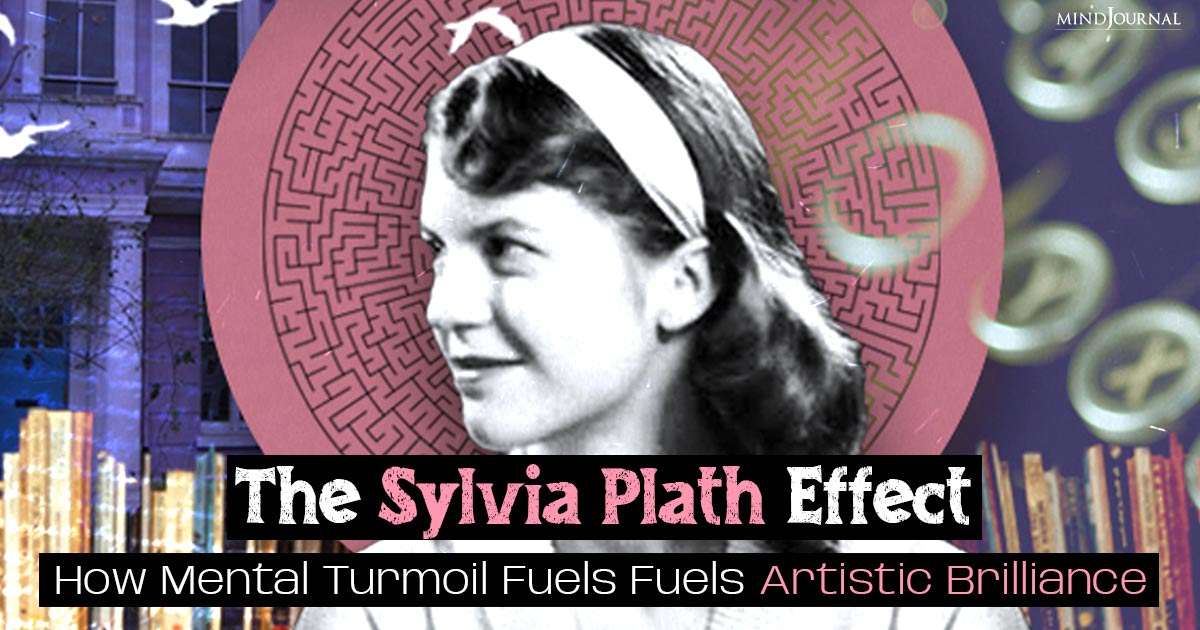
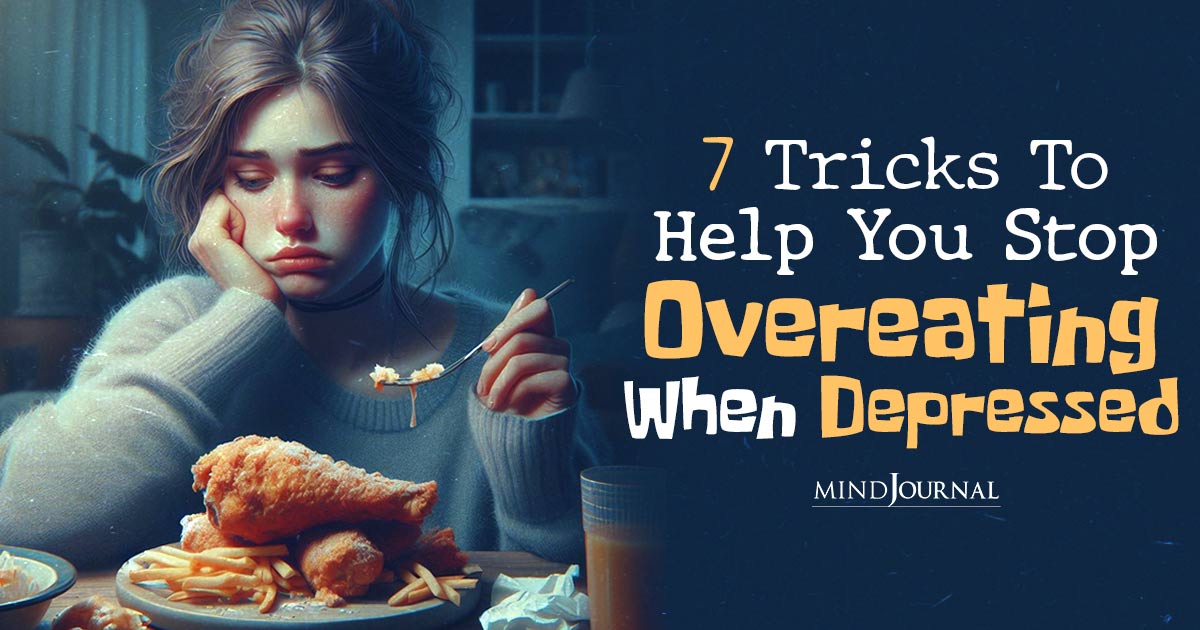
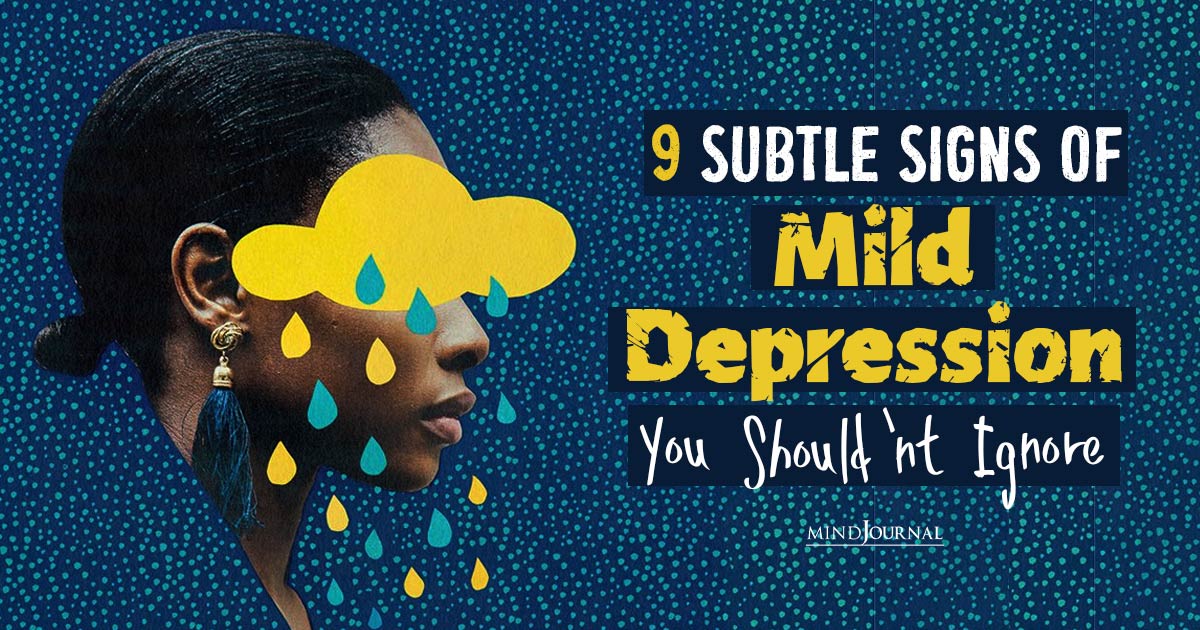
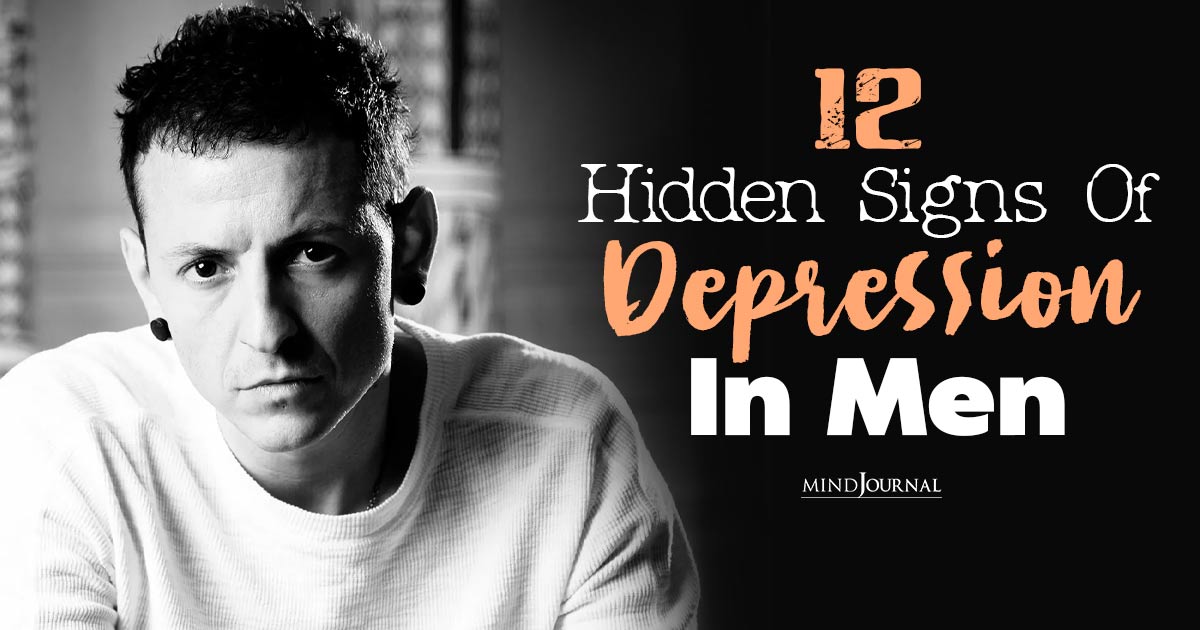
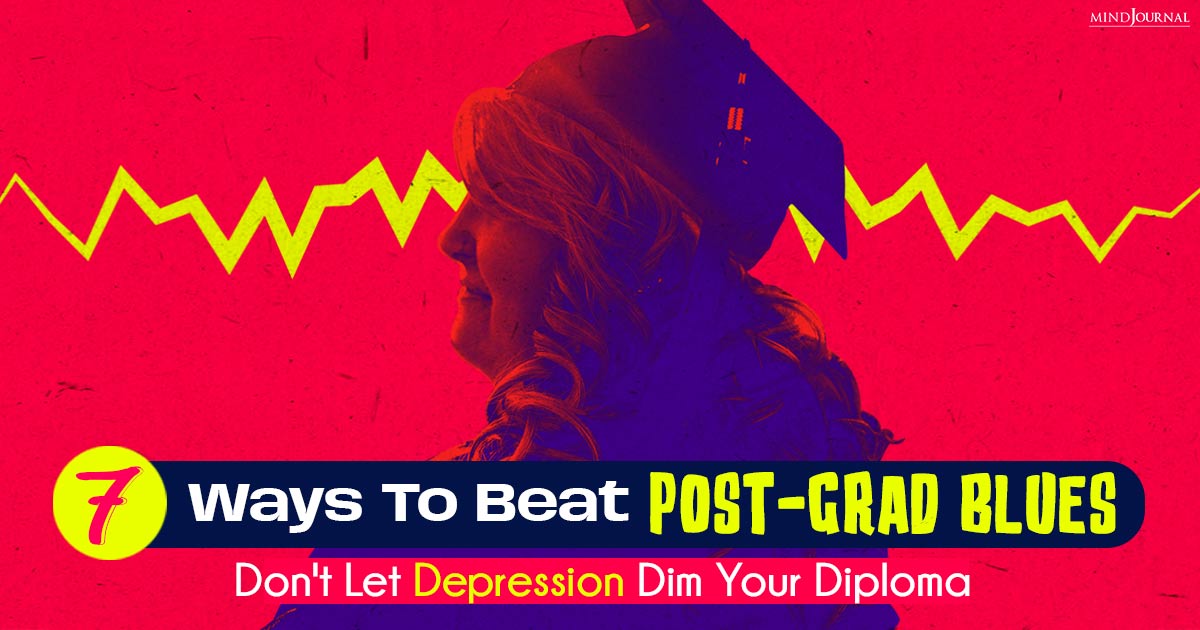
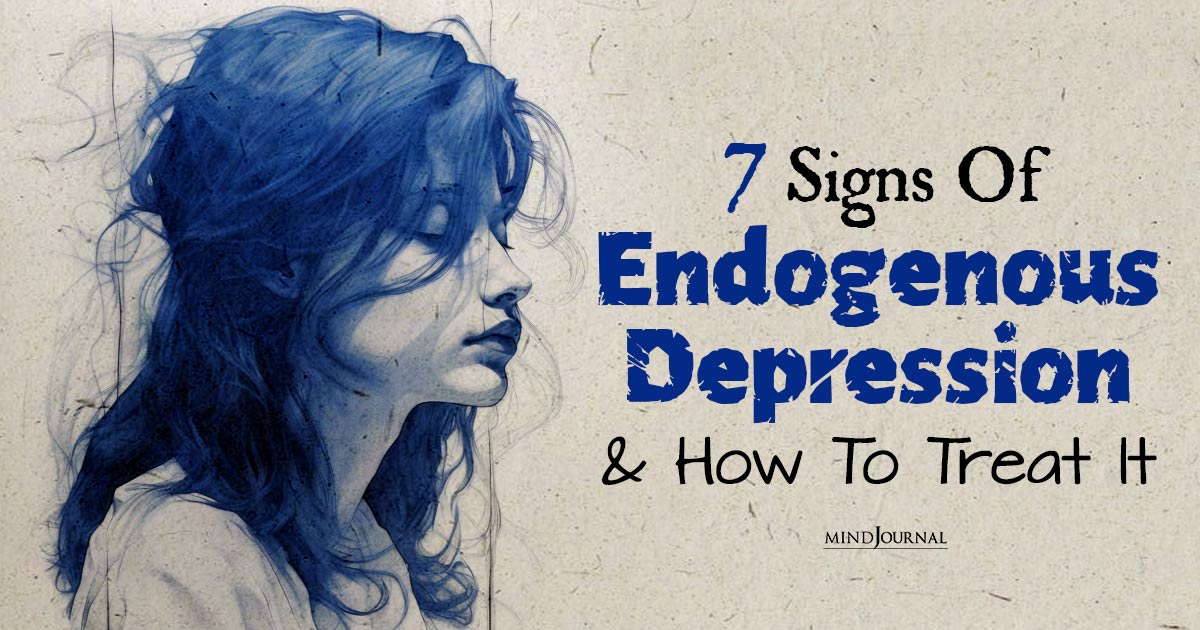
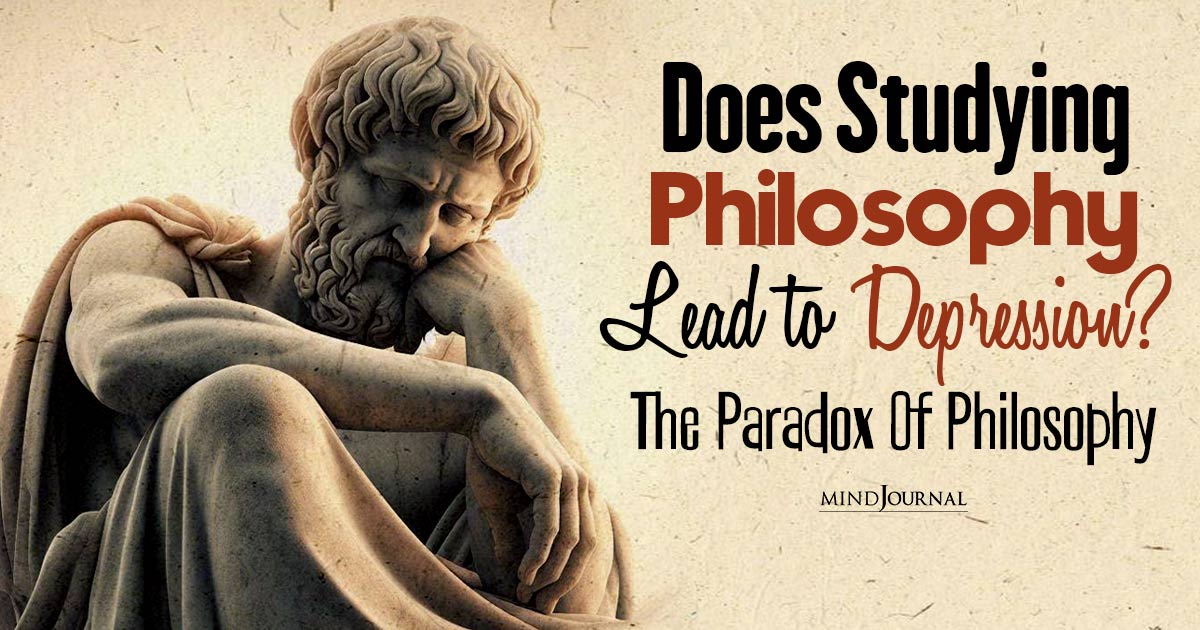
Leave a Reply
You must be logged in to post a comment.